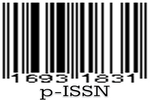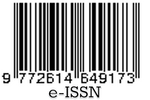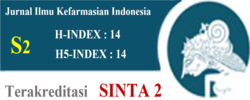The Elevation Concentration of IDO (Indoleamine 2,3-Dioxygenase) Immunosupressan in Supernatant of Mesenchymal Stem Cell Stimulated by Immunoglobulin G Agregate
Abstract
Mesenchymal stem cells have been known to have the nature of supressing immune response. This cell have been proven to reduce the symptoms of organ transplants rejection. Clinically proofing is also being performed on an autoimmune disease caused by the complex immune such as systemic lupus erythematosus (SLE). This study aimed to know aggregated IgG-stimulating effects of mesenchymal stem cells in relation to IDO secretion, an immunosuppressant agent. Mesenchymal stem cells was isolated from liposuction waste and characterized based on its surface molecule accrording to ISCT criterias. The confirmed cell culture was used to the next culture by the addition of heat aggragated immunoglobulins gamma (HAGG) for six days. IDO secreted on supernatant culture was collected and assayed by elisa method at 450 nm. The results showed that there was elevated levels of IDO (16.73-49.5%) on culture with HAGG stimulation than without stimulation. This study could be a part of the basic
References
2. Meisel R, Zibert A, Laryea M, Gobel U, Daubener W, Dilloo D. Human bone marrow stromal cells inhibit allogeneic T-cell responses by indoleamine 2,3-dioxygenase-mediated tryptophan degradation. Blood. 2004. 103(12):4619-21.
3. DelaRosa O, Lombardo E, Beraza A, Mancheno-Corvo P, Ramirez C, Menta R, et al. Requirement of IFN-gamma-mediated indoleamine 2,3-dioxygenase expression in the modulation of lymphocyte proliferation by human adipose-derived stem cells. Tissue Eng Part A. 2009. (10):2795-806.
4. Ryan JM, Barry F, Murphy JM, Mahon BP. Interferon-γ does not break, but promotes the immunosuppressive capacity of adult human mesenchymal stem cells. Clin Exp Immunol. 2007. 149(2):353-63.
5. Kassis I, Grigoriadis N, Gowda-Kurkalli B, Mizrachi-Kol R, Ben-Hur T, Slavin S, et al. Neuroprotection and immunomodulation with mesenchymal stem cells in chronic experimental autoimmune encephalomyelitis. Arch Neurol. 2008. 65(6):753-61.
6. Rafei M, Birman E, Forner K, Galipeau J. Allogeneic mesenchymal stem cells for treatment of experimental autoimmune encephalomyelitis. Mol Ther. 2009. 17(10):1799-803.
7. Auletta JJ, Cooke KR. Bone marrow transplantation: new approaches to immunosuppression and management of acute graft-versus-host disease. Curr Opin Pediatr. 2009. 21(1):30-8.
8. Joseph RW, Couriel DR, Komanduri KV. Chronic graft-versus-host disease after allogeneic stem cell transplantation: challenges in prevention, science, and supportive care. J Support Oncol. 2008. 6(8):361-72.
9. Kovacsovics-Bankowski M, Streeter PR, Mauch KA, Frey MR, Raber A, van’t Hof W, et al. Clinical scale expanded adult pluripotent stem cells prevent graft-versus-host disease. Cell Immunol. 2009. 255(1-2):55-60.
10. Laksmitawati D, Sardjono C, Pawitan J, Sadikin M, Sandra F. Secretion of indoleamine 2,3-dioxygenase, an immunomodulatory substance, by adipose-derived mesenchymal stem cell. Indonesian Journal of Cancer Chemoprevention. 2010. 1(2):92-8.
11. Paul WEM, editor. Fundamental immunology. Philadelphia: Lippincott Williams and Wilkins; 2008.
12. Zuk PA, Zhu M, Mizuno H, Huang J, Futrell JW, Katz AJ, et al. Multilineage cells from human adipose tissue: Implications for cell-based therapies. Tissue Eng. 2001. 7(2):211-28.
13. Sardjono C, Setiawan M, Frisca, Saputra V, Aniko G, Sandra F. Application of a modified method for stem cell isolation from lipoaspirates in a basic lab. Medical Journal of Indonesia. 2009. 18(2):91-6.
14. Tan Sardjono C, Mottram PL, van de Velde NC, Powell MS, Power D, Slocombe RF, et al. Development of spontaneous multisystem autoimmune disease and hypersensitivity to antibody-induced inflammation in Fcgamma receptor IIa-transgenic mice. Arthritis Rheum. 2005. 52(10):3220-9.
15. Gieseke F, Schutt B, Viebahn S, Koscielniak E, Friedrich W, Handgretinger R, et al. Human multipotent mesenchymal stromal cells inhibit proliferation of PBMCs independently of IFNgammaR1 signaling and IDO expression. Blood. 2007. 110(6):2197-200.
16. Bartholomew A SC, Siatkas M et al. Mesenchymal stem cell suppress lymphocyte proliferation in vitro and prolong skin graft survival in vivo. Exp Hematology. 2002.30:42-8.
17. Yanez R, Lamana ML, Garcia-Castro J, Colmenero I, Ramirez M, Bueren JA. Adipose tissue-derived mesenchymal stem cells have in vivo immunosuppressive properties applicable for the control of the graft-versus-host disease. Stem Cells. 2006. 24(11):2582-91.
18. Okamoto R, Yajima T, Yamazaki M, Kanai T, Mukai M, Okamoto S, et al. Damaged epithelia regenerated by bone marrow-derived cells in the human gastrointestinal tract. Nat Med. 2002. 8(9):1011-7.
19. Mellor AL, Munn DH. IDO expression by dendritic cells: Tolerance and tryptophan catabolism. Nat Rev Immunol. 2004. 4(10):762-74.
20. Ge W, Jiang J, Arp J, Liu W, Garcia B, Wang H. Regulatory T-cell generation and kidney allograft tolerance induced by mesenchymal stem cells associated with indoleamine 2,3-dioxygenase expression. Transplantation. 2010. 90(12):1312-20.
21. Sedlmayr P, Blaschitz A, Wintersteiger R, Semlitsch M, Hammer A, MacKenzie CR, et al. Localization of indoleamine 2,3-dioxygenase in human female reproductive organs and the placenta. Mol Hum Reprod. 2002. 8(4):385-91.
22. Spaggiari GM, Capobianco A, Abdelrazik H, Becchetti F, Mingari MC, Moretta L. Mesenchymal stem cells inhibit natural killer-cell proliferation, cytotoxicity, and cytokine production: Role of indoleamine 2,3-dioxygenase and prostaglandin E2. Blood. 2008. 111(3):1327-33.
23. Meirelles Lda S, Fontes AM, Covas DT, Caplan AI. Mechanisms involved in the therapeutic properties of mesenchymal stem cells. Cytokine Growth Factor Rev. 2009. 20(5-6):419-27.
24. Curti A, Trabanelli S, Salvestrini V, Baccarani M, Lemoli RM. The role of indoleamine 2,3-dioxygenase in the induction of immune tolerance: Focus on hematology. Blood. 2009. 113(11):2394-401.
25. Fallarino F, Grohmann U, You S, McGrath BC, Cavener DR, Vacca C, et al. The combined effects of tryptophan starvation and tryptophan catabolites down-regulate T cell receptor zeta-chain and induce a regulatory phenotype in naive T cells. J Immunol. 2006. 176(11):6752-61.
26. Liu XQ, Wang X. Indoleamine 2,3-dioxygenase in tumor induced tolerance. Chin Med J (Engl). 2009. 122(24):3072-7.
27. Jalili RB, Forouzandeh F, Bahar MA, Ghahary A. The immunoregulatory function of indoleamine 2,3 dioxygenase and its application in allotransplantation. Iran J Allergy Asthma Immunol. 2007. 6(4):167-79.
28. Yagi H, Soto-Gutierrez A, Parekkadan B, Kitagawa Y, Tompkins RG, Kobayashi N, et al. Mesenchymal stem cells: Mechanisms of immunomodulation and homing. Cell Transplant. 2010.19(6):667-79.
Licencing
All articles in Jurnal Ilmu Kefarmasian Indonesia are an open-access article, distributed under the terms of the Creative Commons Attribution-NonCommercial-ShareAlike 4.0 International License which permits unrestricted non-commercial used, distribution and reproduction in any medium.
This licence applies to Author(s) and Public Reader means that the users mays :
- SHARE:
copy and redistribute the article in any medium or format - ADAPT:
remix, transform, and build upon the article (eg.: to produce a new research work and, possibly, a new publication) - ALIKE:
If you remix, transform, or build upon the article, you must distribute your contributions under the same license as the original. - NO ADDITIONAL RESTRICTIONS:
You may not apply legal terms or technological measures that legally restrict others from doing anything the license permits.
It does however mean that when you use it you must:
- ATTRIBUTION: You must give appropriate credit to both the Author(s) and the journal, provide a link to the license, and indicate if changes were made. You may do so in any reasonable manner, but not in any way that suggests the licensor endorses you or your use.
You may not:
- NONCOMMERCIAL: You may not use the article for commercial purposes.
This work is licensed under a Creative Commons Attribution-NonCommercial-ShareAlike 4.0 International License.





 Tools
Tools





















